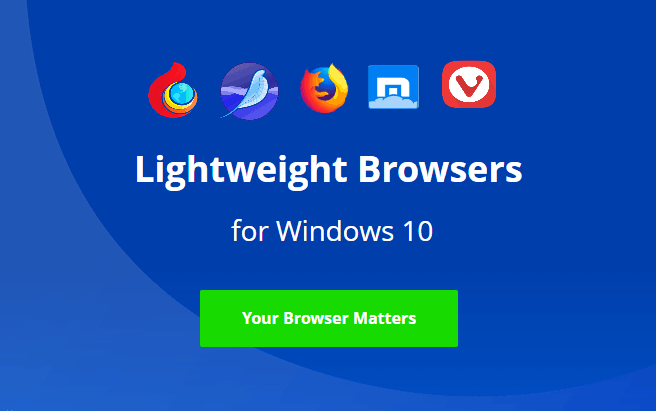
If you want to browse the web without eating your system resources then a light browser is the best choice. These browsers work efficiently and consume minimal RAM which will make your laptop / PC run faster and longer.
Loaded with advanced features and fast browsing characteristics Comodo IceDragon offers a secure and lightweight browser for Windows. It is integrated with DNS servers for error-free conversion of website URLs to IP addresses and also encrypts data to protect from viruses.
Opera
Lightweight browsers consume less memory than mainstream web browsers, allowing you to use more extensions while keeping your computer running smoothly. This is especially useful on older computers or devices with limited resources.
Opera is one of the most popular lightweight browsers available for Windows 10. It uses a minimal amount of system resources and doesn’t drain your battery or memory, making it perfect for use on older computers. It also supports a wide variety of plugins and extensions, including the ability to block ad trackers.
Another great option for users with low-end computers is Midori. This open-source web browser offers class-apart functionality like RSS support, bookmarks, spell-checker and an incognito mode. It’s based on Chromium and is free to download.
Another good choice for Windows users is Waterfox. This browser is a lightweight alternative to Firefox and offers ad-blocking features as well as the ability to sync your plugins, settings and history. It also supports old Firefox add-ons and has frequent security updates. It is also a secure browser as it doesn’t send data or telemetry back to Mozilla.
Edge
A spawn from the much-ridiculed Internet Explorer, Edge is one of the lightest browsers for windows that uses very few system resources. It is also fast and has top-notch privacy and security features. It supports the latest HTML5 and JS standards. It can run in offline mode and offers a variety of other useful tools, such as voice interaction, mouse gestures, and restore sessions functionalities.
Another light browser is Vivaldi, which was designed for users who are privacy-oriented. It works on the Chrome engine and promises optimized browser functioning and a quick loading speed. It also supports ad-blockers, password managers, and other Chrome web extensions. Its interface is highly customizable and includes full tab arrangement capabilities, ad-blockers, and an image property viewer.
K-Meleon, which has the tagline “The browser you control”, is another lightweight browser for windows that allows users to customize its UI and features. Its customization options include skins, button locations, toolbar locations, menus, proxies, cookies, and Javascript. The browser also features a privacy policy and does not share user information with third-party sites.
Vivaldi
If you’re looking for a feature-rich browser that’s designed to give you more control over your workflow, Vivaldi is worth checking out. This browser is built on the Chromium codebase, but it has a distinct focus on productivity and features that make it stand out from the competition. Its super flexible user interface, crazy cool tab management and secure & reliable built-in apps are just a few of the reasons why it has quickly become the gold standard in the browser space.
One of the most innovative features is its tab stacking, which allows you to group multiple tabs into a single window that displays above your tab bar. You can then select individual tabs or the entire stacked windows to load them. You can also hibernate individual tabs or a whole stack of tabs, freeing up resources while you’re not using them.
Another great feature is the ability to create workspaces, which separates your web browsing tasks into visual groups so that you can easily switch between them. This is a huge time-saver for people who work across several websites and services.
Midori
Midori is a web browser that uses the Webkit engine and is free to use. It has many features that are similar to those of other modern browsers, including tabbed browsing and a variety of customization options. It is also lightweight and does not consume a lot of memory.
The minimalist interface of this browser is designed to promote user-friendly browsing. It has features like powerful ad blocking and privacy settings that can help protect users’ online identity. It also supports extensions and offers multiple configuration options. It does not have a news feed or message push, and it requires few permissions.
The developer of the software has made it available to all users through a git repository. This means that it can be easily installed on any computer without needing to install a package manager. It is also compatible with most Linux distributions, such as Ubuntu and Elementary OS. It is a good option for people who want to try out new browsers without sacrificing speed or security. It also has a feature that allows users to save pages for reading later.
K-Meleon
K-Meleon is a lightweight Web browser that requires very little RAM. Its default settings are geared toward security, but users can also set it to prioritize speed or privacy. The browser also supports several plugins. Moreover, it can block ads and popups. However, it may take a little longer to load pages than other browsers.
This browser uses a text-based configuration system, making it easy to customize its appearance and features. Users can change the toolbar, menus, and keyboard shortcuts by editing these files. In addition, it supports macros. Macros are small extensions that can be written and edited in a text editor.
This browser is available for Windows and Linux. It uses a minimal graphical user interface and is designed for older computers that aren’t capable of running newer versions of Mozilla Firefox. It is fast and secure, and it has good support for old versions of HTML5. It also passes the Acid Test, which tests page rendering. However, it does not display favicons or throbbers, and it does not support mouse gestures.







